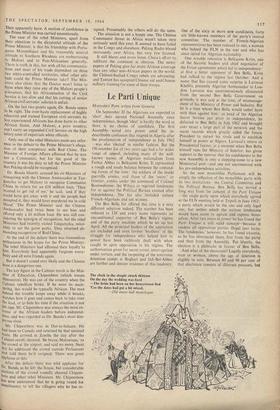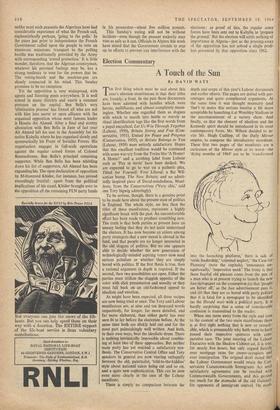Le Parti Unique
MARGARET POPE writes from Geneva:
On September 20 the Algerians are expected to 'elect' their second National Assembly since independence, though 'elect' is hardly the word as there is no choice of candidate. The first Assembly—voted into power amid the in- describable confusion that reigned in Algeria after the proclamation of independence in July 1962 7-was also 'elected' similar fashion. But the 196-member list of two years ago. had a far wider range of appeal, including many of the well- known names of Algerian nationalism from Ferhat Abbas to Belkacem Krim. It represented a rough and ready balance between the,contend- ing forces of the time : the soldiers' of the inside guerrilla armies, and those 'of the 'outer,' or frontier, armies under' the command of Colonel Boumedienne; the Wilaya or regional tendencies for or against the Political Bureau created after independence. The list also included sixteen French-Algerians and ten women.
The Ben Bella list offered this time is a very different Selection indeed. The number has been reduced to 138 and every name represents an unconditional supporter of Ben 'Bella's regime and of the party machine which he set up last April. All the principal leader's of the opposition are excluded and even former 'brothers' of the struggle for independence who helped him to power have been ruthlessly. dealt with when caught in open opposition to his regime. The authorisation given for secret arrest, interrogation under torture, and the reopening of the notorious detention camps at Boghari and Sidi-Bel-Abbes are further and sinister evidence of this tendency. Out of the sixty or more new candidates, forty are little-known members of the party's central committee. The number of French-Algerian representatives has been reduced to one, a woman who helped the FLN in the war and who has since opted for Algerian nationality.
One notable omission is Belkacem Krim, one of the historic leaders and chief negotiator of the Evian agreements which led to independence: at first a bitter opponent of Ben Bella, Krim had rallied to the regime last October. And a name that has caused some surprise is Laroussi Khelifa, presently Algerian Ambassador to Lon- don. Laroussi was unceremoniously eliminated from the second 'Ben Bella Government on grounds, it was said at the time, of mismanage- ment of his Ministry of Power and Industry. But he is a man whom Ben Bella would rather have With than against him : as head of the Algerian Secret Service just prior to independence, he defected to Ben Bella in July 1962 and brought over intact a large part of the network and the secret records which greatly aided the future President to outwit his rivals and to establish himself in power at Algiers. Laroussi's return to Presidential favour, at a moment when Ben Bella himself runs the Ministry of Interior, has given support to the rumour that his candidature to the new Assembly is only a stepping-stone to a new Ministerial post—and one not unconnected with his pre-independence activities.
So the new monolithic Parliament will be simply the reflection of the monolithic party with its two institutions -the Central Committee and the Political Bureau. Ben Bella has moved a long way from the concept of the Parti Unique --the single party upon which' everybody agreed at the FLN meeting held at Tripoli in June 1962: a party which would be the one and only legal one, but within which the various tendencies Would have room to agitate and express them- selves. After two years in power he has found the Parti Unique a still valid concept—because it renders all opposition parties illegal ipso facto. The 'tendencies.' however, he has found irksome, so he has eliminated them, first from the party and .then from the Assembly. Put bluntly, the • election is a plebiscite in favour of Ben Bella. And what of the electorate? Legally everybody, man or woman, above the age of nineteen is eligible to vote. Between 80 and 90 per cent of• that electorate consists of illiterate peasants, but
unlike most such peasants the Algerians have had considerable experience of what the French call, euphemistically perhaps, 'going to the polls.' In the years just prior to independence the French Government called upon the people to vote on numerous occasions; transport to the polling booths was traditionally provided by the Army with corresponding 'armed protection.' It is little wonder, therefore, that the Algerian countryman, whatever his personal feelings may be, has a strong tendency to vote for the powers that be. The voting-booth and the machine-gun are closely connected in his mind. This Sunday promises to be no exception.
Yet the opposition is very widespread, with agents and listening posts everywhere. It is well armed in many districts and exerts a constant pressure on the capital. Ben Bella's very 'elimination process' has forced all who are not with him into secret or open alliance with the organised opposition whose most famous leader is Hosein Ait Ahmed. After a final and stormy altercation with Ben Bella in June of last year Mt Ahmed left his seat in the Assembly for his native Kabylia where he has organised slowly and systematically, his Front of Socialist Forces. His organisation engages in full-scale operations against the regular armed forces of Colonel Boumedienne, Ben Bella's principal remaining supporter. While Ben Bella has been whittling down his list of supporters, Ait Ahmed has been expanding his. The open declaration of opposition by Mohammed Khider, for instance, has proved exceedingly fruitful: apart from the political implications of his stand, Khider brought over to the opposition all the remaining FLN party funds in his possession—about five million pounds.
This Sunday's voting will not be without incident—even though the peasant majority may vote as safe as it can. Officials in Algiers this week have stated that the Government intends to step up its efforts to prevent any interference with the
elections : as proof of this, the regular army forces have been sent out to Kabylia to 'prepare the ground.' But the election will settle nothing of importance in Algeria—just as the pruning-away of the opposition has not solved a single prob- lem presented by that opposition since 1962.



































 Previous page
Previous page